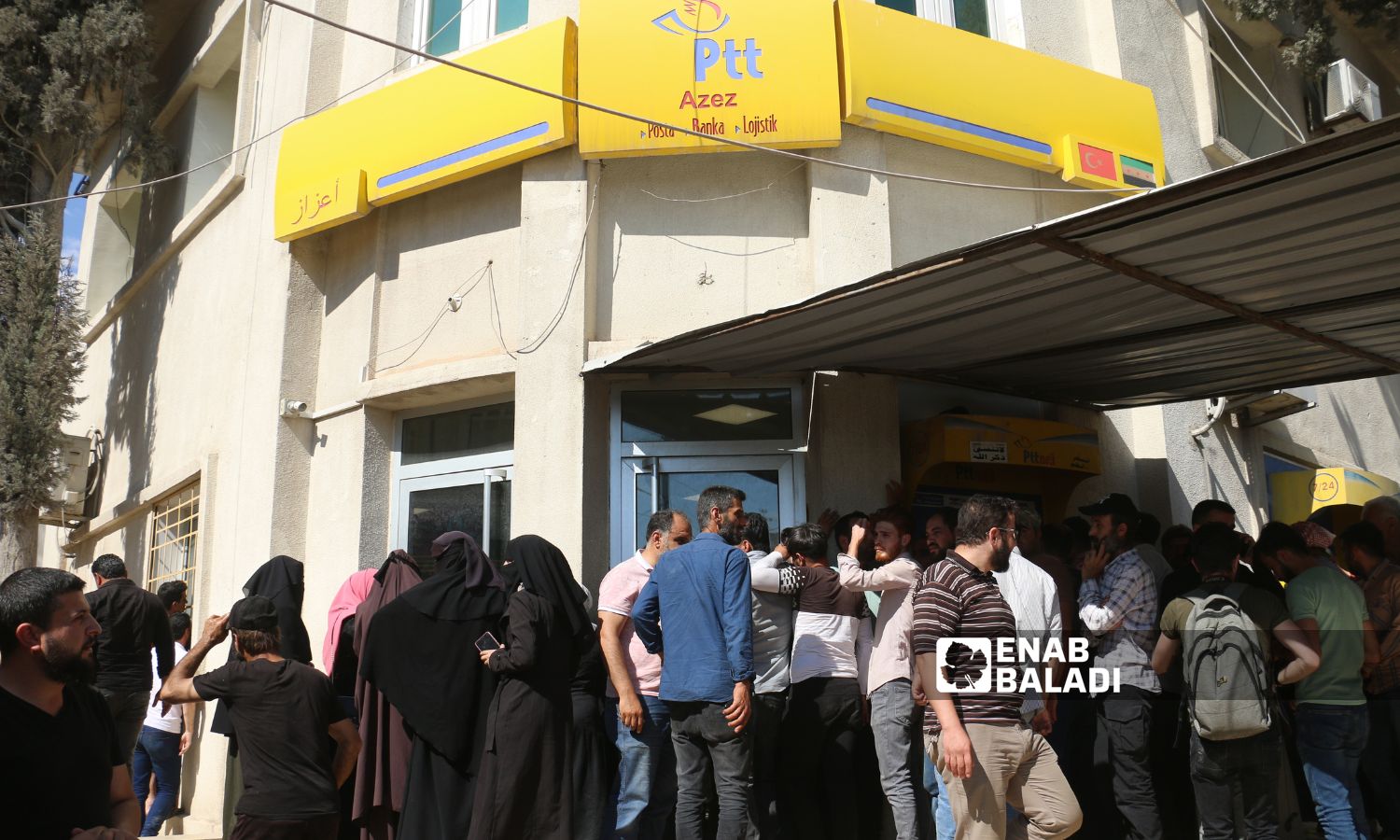



Enab Baladi – Jana al-Issa
The First Investment Conference, which was held in the Aleppo countryside northwest of Syria under the supervision of the Syrian Interim Government (SIG) that controls the area, opened the door to questions about the absence of banks, which many experts and investors agree is one of the main obstacles to investment.
The area suffers from an almost complete absence of various banking services, although Turkey’s control over the area could be considered a factor that helps to improve these services. Over the past years, several branches of the Turkish Postal and Shipping Corporation (PTT) have been opened, providing some financial and banking services.
The PTT branches offer simple banking services related to the delivery of employee salaries, as employees in those areas, including teachers, police, council staff, doctors, and preachers, are given bank cards to withdraw their salaries, in addition to opening personal bank accounts where citizens can deposit their money or withdraw the deposited amounts at any time, either in Turkish lira or in dollars.
These centers also provide a service for receiving and delivering international transfers to and from all countries of the world.
The absence of banks is one of the main obstacles to investment in northern Syria, according to political economist Yahya al-Sayed Omar, who points out that before starting any efforts to stimulate investment, it is necessary to establish a banking system capable of supporting investment work, as banks are considered the lifeline of investment.
In a previous report, Enab Baladi discussed with researchers, specialists, and experts the reality of investment in the area, the possibilities for it, the nature of potential projects, and the needs of the area for creating an investment environment, as well as the association with the “voluntary return” project, and the responsibility for protecting investors’ funds and guaranteeing their rights.
Al-Sayed Omar clarified that it is necessary to realize that there are many types of banks, including commercial, industrial, agricultural, and real estate banks, as well as micro and small finance banks, each with its conditions, requirements, and objectives.
The Minister of Economy in the Syrian Interim Government, Abdul Hakim al-Masri, told Enab Baladi that one of the main obstacles to investment in the area is the absence of banks, which causes a problem in the transfer of funds between countries, especially if they are in large quantities and in foreign currencies.
A bank must be linked to the SWIFT system to monitor funds and ensure that there is no dealing with entities or individuals related to terrorism, and all financial transfers in various countries around the world must go through this server.
Due to the lack of legal recognition of the Interim Government, it is not permitted to open an internationally recognized bank, according to al-Masri, who pointed out that the opening of any such bank would also require the approval of the Syrian regime to avoid legal issues in this regard.
It is not possible to rely on PTT centers as a substitute for banks, since dealings in them are conducted only to and from Turkey, and they do not carry out large financial transfers, according to the Minister of Economy.
The Syrian Interim Government, the political umbrella for the Turkey-backed Syrian National Army (SNA), controls the northern and eastern countrysides of Aleppo and the cities of Tal Abyad and Ras al-Ain in northeastern Syria.
Researcher Yahya al-Sayed Omar explained that if there is a desire to establish commercial and industrial banks, they must be linked to the international banking system, which is not available due to the lack of political recognition of the Interim Government.
The solution in this case is through closed or semi-closed banks, and the absence of a link to the international banking system can be compensated by cooperating with banks in countries supporting the Syrian cause, according to al-Sayed Omar.
Banks’ roles are not limited to financing but also include mediation in import and export operations, and this mediation cannot take place without a network of relations with other banks.
In the case of establishing micro or small finance banks, it is possible to dispense with the connection to the international banking system, and even though this link enhances their effectiveness, it is not a mandatory condition, according to the researcher.
Al-Sayed Omar added that one of the main requirements for establishing banks in the region is the presence of a central bank or a financial institution responsible for regulating the banking business, as the absence of such a supervisory institution would lead to chaos in the operation and financial crises and possibly bankruptcy, as well as the necessity for investors capable of financing the banks or contributing to their capital.
Most of these requirements may not be executable under the prevailing political and economic conditions. Therefore, one of the immediate solutions that researcher Yahya al-Sayed Omar sees is establishing savings banks that accept individual savings, even if in small amounts, and later invest these funds through financing investment activities. Through these banks, it is possible to do without large financiers and the connection to the international banking system, but it is necessary to work to gain the trust of depositors, and it is suggested here to rely on an Islamic banking system, since the majority of the population in the area may not deal with usurious banks.
There are several types of banks around the world, each with different roles in the economy, and the most common are eight banks:
if you think the article contain wrong information or you have additional details Send Correction